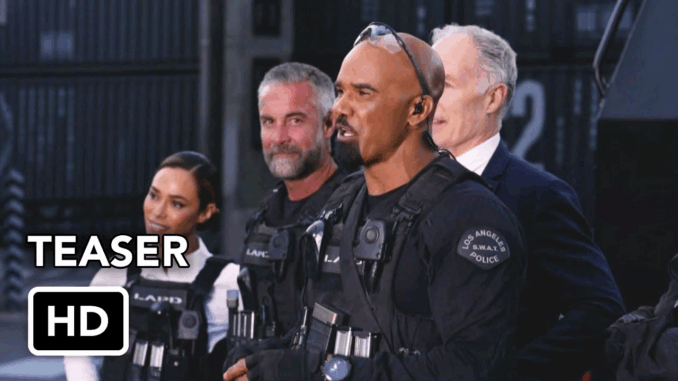
Introduction: A TV Resurrection Nobody Saw Coming
You’re watching your favorite show. The season wraps. Boom—cancellation. You’re heartbroken. Then suddenly… it’s back? That was the wild ride S.W.A.T. fans experienced after CBS announced the cancellation of the hit procedural following Season 6—only to reverse course and bring it back days later.
So, what really happened? Was it ratings? Budgets? Backlash? Let’s dig into the real reasons S.W.A.T. got the axe and why CBS decided to resurrect it from the dead.
The Shocking Season 6 Cancellation
Fans Left in Disbelief
After six strong seasons, CBS stunned fans by announcing that S.W.A.T. was ending. No warning. No farewell tour. Just… done. Naturally, fans went into overdrive on social media, asking the same question: “Why cancel a show that’s doing well?”
Behind the Decision — It Wasn’t About Ratings
Wait… S.W.A.T. Was Still Performing Strong?
Yep. S.W.A.T. wasn’t struggling in the ratings. In fact, it was pulling in solid viewership numbers, consistently winning its time slot and attracting a loyal audience. So what gives?
Follow the Money: Budget Battles and Ownership Issues
Who Pays the Bills Matters
Here’s the scoop: S.W.A.T. is produced by Sony Pictures Television but aired on CBS. That means CBS didn’t fully own the show, and that makes profit-sharing more complicated—and less appealing.
Rising Production Costs
As shows age, costs increase. Cast salaries go up. Crew contracts expand. And with S.W.A.T. packed full of action scenes, it’s not a cheap show to produce. CBS had to decide: is it worth paying more for a show it doesn’t fully own?
The Power of the Fanbase
#SaveSWAT Takes Over Twitter
Fans weren’t quiet about the cancellation. In fact, the #SaveSWAT campaign picked up massive traction, with celebrities, cast members, and fans rallying to pressure CBS. And guess what? It worked.
Shemar Moore’s Impact: A Voice That Couldn’t Be Ignored
The Star Speaks Out
Shemar Moore—S.W.A.T.’s leading man—didn’t stay silent. He called CBS out for its decision, describing it as a mistake and an injustice to the cast, crew, and loyal fans. His Instagram video went viral, bringing more heat on CBS.
CBS Reverses Course: The Un-Cancellation Announcement
A TV Rarity
Just three days after announcing the show’s end, CBS made a dramatic U-turn: S.W.A.T. was coming back for a seventh season. That’s nearly unheard of in the TV world, where cancellations are usually final.
The Real Reason CBS Changed Its Mind
Fan Pressure and Media Attention
CBS execs weren’t blind to the intense backlash. The PR fallout from canceling a popular, diverse, and successful show wasn’t worth the marginal cost savings.
A Strategic Move in a Shifting Media Landscape
With streaming competition heating up, network loyalty matters more than ever. Keeping a proven hit like S.W.A.T.meant retaining viewers who might’ve otherwise jumped ship.
What’s Different in Season 7?
Shorter Final Season
CBS brought S.W.A.T. back for Season 7 but gave it a shortened final run—likely as a compromise. Fewer episodes, tighter budget, and a real send-off. Not ideal, but better than a cold cancellation.
The Emotional Rollercoaster for the Cast and Crew
One Day Fired, Next Day Hired
Imagine thinking your job is over… then finding out it’s not. That’s exactly what happened to the S.W.A.T. crew. The sudden reversal left many stunned—but also deeply grateful.

What This Means for Other Shows
The Power of Audience Voice
This situation shows that in today’s connected world, fans can make a difference. With enough passion, visibility, and social traction, even corporate decisions can get overturned.
CBS’s Track Record With Sudden Reversals
Not the First Time, But Still Rare
While not entirely new, CBS doesn’t often walk back cancellations. This move was bold—and possibly a sign of changing priorities in how networks respond to their audiences.
Legacy of S.W.A.T.: A Show That Fought to Survive
More Than Just a Procedural
S.W.A.T. has always stood out—not just for action, but for tackling tough issues like race, police reform, and community justice. Canceling it felt like cutting off an important voice in mainstream TV.
What’s Next for the Cast Post-SWAT?
Opportunities Are Knocking
With Shemar Moore and others gaining even more visibility from this controversy, expect to see them in new, high-profile projects once the show ends for real.
Conclusion: A Cancelation, a Comeback, and a Legacy
In the cutthroat world of television, S.W.A.T. pulled off a near miracle. Canceled not for poor performance, but business politics, it bounced back thanks to fan passion, star power, and undeniable value. Its final season may be shorter, but its impact will be lasting. And if we’ve learned anything, it’s this: never count a good show—or its fans—out.
FAQs
1. Why did CBS cancel S.W.A.T. in the first place?
Mainly due to budget concerns and complicated profit-sharing since CBS didn’t fully own the show.
2. What changed CBS’s mind?
A mix of massive fan backlash, media coverage, and vocal pushback from the cast—especially Shemar Moore.
3. Is Season 7 the last season of S.W.A.T.?
Yes, CBS announced Season 7 as the final season, though fans remain hopeful for spin-offs or future revivals.
4. How many episodes will be in Season 7?
The final season will have a reduced number of episodes, likely around 13, offering closure without a full 22-episode arc.
5. Could S.W.A.T. move to a streaming platform in the future?
It’s possible. With its strong following, streaming services could pick it up or continue its universe in another format.